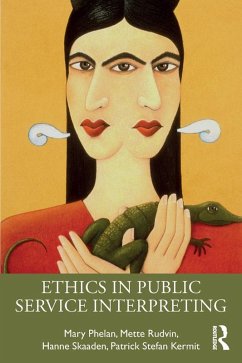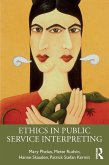Mary Phelan, Mette Rudvin, Hanne Skaaden, Patrick Kermit
Ethics in Public Service Interpreting (eBook, PDF)
40,95 €
40,95 €
inkl. MwSt.
Sofort per Download lieferbar

20 °P sammeln
40,95 €
Als Download kaufen

40,95 €
inkl. MwSt.
Sofort per Download lieferbar

20 °P sammeln
Jetzt verschenken
Alle Infos zum eBook verschenken
40,95 €
inkl. MwSt.
Sofort per Download lieferbar
Alle Infos zum eBook verschenken

20 °P sammeln
Mary Phelan, Mette Rudvin, Hanne Skaaden, Patrick Kermit
Ethics in Public Service Interpreting (eBook, PDF)
- Format: PDF
- Merkliste
- Auf die Merkliste
- Bewerten Bewerten
- Teilen
- Produkt teilen
- Produkterinnerung
- Produkterinnerung

Bitte loggen Sie sich zunächst in Ihr Kundenkonto ein oder registrieren Sie sich bei
bücher.de, um das eBook-Abo tolino select nutzen zu können.
Hier können Sie sich einloggen
Hier können Sie sich einloggen
Sie sind bereits eingeloggt. Klicken Sie auf 2. tolino select Abo, um fortzufahren.

Bitte loggen Sie sich zunächst in Ihr Kundenkonto ein oder registrieren Sie sich bei bücher.de, um das eBook-Abo tolino select nutzen zu können.
Four leading researchers from across Europe share their expertise on ethics, the theory behind ethics, and what it means to be a public service interpreter. The book serves as both an explanatory and informative core text for students and as a guide or reference book for interpreter trainees as well as for professional interpreters.
- Geräte: PC
- mit Kopierschutz
- eBook Hilfe
Andere Kunden interessierten sich auch für
![Routledge Handbook of Japanese Sociolinguistics (eBook, PDF) Routledge Handbook of Japanese Sociolinguistics (eBook, PDF)]() Routledge Handbook of Japanese Sociolinguistics (eBook, PDF)46,95 €
Routledge Handbook of Japanese Sociolinguistics (eBook, PDF)46,95 €![Ethics in Public Service Interpreting (eBook, ePUB) Ethics in Public Service Interpreting (eBook, ePUB)]() Mary PhelanEthics in Public Service Interpreting (eBook, ePUB)40,95 €
Mary PhelanEthics in Public Service Interpreting (eBook, ePUB)40,95 €![The Routledge Handbook of Translation and Migration (eBook, PDF) The Routledge Handbook of Translation and Migration (eBook, PDF)]() The Routledge Handbook of Translation and Migration (eBook, PDF)45,95 €
The Routledge Handbook of Translation and Migration (eBook, PDF)45,95 €![Language Policy and Political Economy (eBook, PDF) Language Policy and Political Economy (eBook, PDF)]() Language Policy and Political Economy (eBook, PDF)22,95 €
Language Policy and Political Economy (eBook, PDF)22,95 €![The Oxford Handbook of Language Policy and Planning (eBook, PDF) The Oxford Handbook of Language Policy and Planning (eBook, PDF)]() The Oxford Handbook of Language Policy and Planning (eBook, PDF)75,95 €
The Oxford Handbook of Language Policy and Planning (eBook, PDF)75,95 €![Politics, Lies and Conspiracy Theories (eBook, PDF) Politics, Lies and Conspiracy Theories (eBook, PDF)]() Marcel DanesiPolitics, Lies and Conspiracy Theories (eBook, PDF)40,95 €
Marcel DanesiPolitics, Lies and Conspiracy Theories (eBook, PDF)40,95 €![Creating New Languages of Resistance (eBook, PDF) Creating New Languages of Resistance (eBook, PDF)]() Omid TofighianCreating New Languages of Resistance (eBook, PDF)37,95 €
Omid TofighianCreating New Languages of Resistance (eBook, PDF)37,95 €-
-
-
Four leading researchers from across Europe share their expertise on ethics, the theory behind ethics, and what it means to be a public service interpreter. The book serves as both an explanatory and informative core text for students and as a guide or reference book for interpreter trainees as well as for professional interpreters.
Hinweis: Dieser Artikel kann nur an eine deutsche Lieferadresse ausgeliefert werden.
Dieser Download kann aus rechtlichen Gründen nur mit Rechnungsadresse in A, B, BG, CY, CZ, D, DK, EW, E, FIN, F, GR, HR, H, IRL, I, LT, L, LR, M, NL, PL, P, R, S, SLO, SK ausgeliefert werden.
Hinweis: Dieser Artikel kann nur an eine deutsche Lieferadresse ausgeliefert werden.
Produktdetails
- Produktdetails
- Verlag: Taylor & Francis eBooks
- Seitenzahl: 214
- Erscheinungstermin: 16. Oktober 2019
- Englisch
- ISBN-13: 9781317502852
- Artikelnr.: 57922743
- Verlag: Taylor & Francis eBooks
- Seitenzahl: 214
- Erscheinungstermin: 16. Oktober 2019
- Englisch
- ISBN-13: 9781317502852
- Artikelnr.: 57922743
- Herstellerkennzeichnung Die Herstellerinformationen sind derzeit nicht verfügbar.
Mary Phelan lectures in translation and public service interpreting at Dublin City University, Ireland, and is the chairperson of the Irish Translators' and Interpreters' Association. Her research relates to the historical provision of court interpreters in Ireland, current interpreter provision in various settings, and associated legislation.
Mette Rudvin completed her PhD in Translation Studies in the UK in 1997 and has been teaching a variety of English and translation and interpreting related subjects at the University of Bologna since 1996; she also set up the first university training course for legal interpreters for minority languages in Italy. She has specialized in Community Interpreting/PSI, a field in which she has published widely, but her areas of research and publication also include interpreting/translation and philosophy, translation and children's literature, ELF, language and game-theory, oral narrative, and Pakistan-studies.
Hanne Skaaden teaches interpreting at Oslo Metropolitan University, Norway. Her research covers first-language attrition and the bilingual migrant, remote Interpreting and the process of professionalisation in PSI. She has extensive experience with interpreting in the Norwegian public sector.
Patrick Stefan Kermit has a background in philosophy and theoretical ethics, and has worked in interpreter education for many years. His research encompasses several projects looking into interpreting in the context of the criminal justice system in Norway.
Mette Rudvin completed her PhD in Translation Studies in the UK in 1997 and has been teaching a variety of English and translation and interpreting related subjects at the University of Bologna since 1996; she also set up the first university training course for legal interpreters for minority languages in Italy. She has specialized in Community Interpreting/PSI, a field in which she has published widely, but her areas of research and publication also include interpreting/translation and philosophy, translation and children's literature, ELF, language and game-theory, oral narrative, and Pakistan-studies.
Hanne Skaaden teaches interpreting at Oslo Metropolitan University, Norway. Her research covers first-language attrition and the bilingual migrant, remote Interpreting and the process of professionalisation in PSI. She has extensive experience with interpreting in the Norwegian public sector.
Patrick Stefan Kermit has a background in philosophy and theoretical ethics, and has worked in interpreter education for many years. His research encompasses several projects looking into interpreting in the context of the criminal justice system in Norway.
Introduction
Part I: Situating Interpreting Ethics in Moral Philosophy
1.1 Introduction: Sector-specific interpreting. Interpreter agency and
ethical challenges
1.2 Contextualising PSI ethics: history, philosophy and professional
practice
1.3 Ethics in Philosophy
1.4 Loyalty, Honesty and Truth-Telling. The foundation of the accuracy
ethic?
1.5 The Philosophy of Ethics: a brief look at the development of some
central tenets
1.6 The Ethics of translation - ethics in Translation Studies
1.7 Summing Up: The PSI-Moral Philosophy ethical interface
Concluding remarks: The existential anguish of choice and decision-making
References
Part II: Codes of Ethics
2.1 Historical Examples of Interpreter Ethics
2.2 Regulation of Professions
2.3 Association codes of ethics
2.4 Advocacy
2.5 Company codes of ethics for interpreters
2.6 The Norwegian example
2.7 Intercultural Mediators
2.8 Conclusion
2.9 Ethics in Real Life Cases
Conclusion
References
Part III: Ethics and Profession
3.1 Why do we need professional ethics?
3.2 What is a profession?
3.3 How extensive a domain for the interpreter's exercise of discretion?
3.4 Interpreting as interaction
3.5 Ethics, trust and the organisational aspect of professions
Conclusion: Ethics, education and professional integrity
References
Index
Part I: Situating Interpreting Ethics in Moral Philosophy
1.1 Introduction: Sector-specific interpreting. Interpreter agency and
ethical challenges
1.2 Contextualising PSI ethics: history, philosophy and professional
practice
1.3 Ethics in Philosophy
1.4 Loyalty, Honesty and Truth-Telling. The foundation of the accuracy
ethic?
1.5 The Philosophy of Ethics: a brief look at the development of some
central tenets
1.6 The Ethics of translation - ethics in Translation Studies
1.7 Summing Up: The PSI-Moral Philosophy ethical interface
Concluding remarks: The existential anguish of choice and decision-making
References
Part II: Codes of Ethics
2.1 Historical Examples of Interpreter Ethics
2.2 Regulation of Professions
2.3 Association codes of ethics
2.4 Advocacy
2.5 Company codes of ethics for interpreters
2.6 The Norwegian example
2.7 Intercultural Mediators
2.8 Conclusion
2.9 Ethics in Real Life Cases
Conclusion
References
Part III: Ethics and Profession
3.1 Why do we need professional ethics?
3.2 What is a profession?
3.3 How extensive a domain for the interpreter's exercise of discretion?
3.4 Interpreting as interaction
3.5 Ethics, trust and the organisational aspect of professions
Conclusion: Ethics, education and professional integrity
References
Index
Introduction
Part I: Situating Interpreting Ethics in Moral Philosophy
1.1 Introduction: Sector-specific interpreting. Interpreter agency and
ethical challenges
1.2 Contextualising PSI ethics: history, philosophy and professional
practice
1.3 Ethics in Philosophy
1.4 Loyalty, Honesty and Truth-Telling. The foundation of the accuracy
ethic?
1.5 The Philosophy of Ethics: a brief look at the development of some
central tenets
1.6 The Ethics of translation - ethics in Translation Studies
1.7 Summing Up: The PSI-Moral Philosophy ethical interface
Concluding remarks: The existential anguish of choice and decision-making
References
Part II: Codes of Ethics
2.1 Historical Examples of Interpreter Ethics
2.2 Regulation of Professions
2.3 Association codes of ethics
2.4 Advocacy
2.5 Company codes of ethics for interpreters
2.6 The Norwegian example
2.7 Intercultural Mediators
2.8 Conclusion
2.9 Ethics in Real Life Cases
Conclusion
References
Part III: Ethics and Profession
3.1 Why do we need professional ethics?
3.2 What is a profession?
3.3 How extensive a domain for the interpreter's exercise of discretion?
3.4 Interpreting as interaction
3.5 Ethics, trust and the organisational aspect of professions
Conclusion: Ethics, education and professional integrity
References
Index
Part I: Situating Interpreting Ethics in Moral Philosophy
1.1 Introduction: Sector-specific interpreting. Interpreter agency and
ethical challenges
1.2 Contextualising PSI ethics: history, philosophy and professional
practice
1.3 Ethics in Philosophy
1.4 Loyalty, Honesty and Truth-Telling. The foundation of the accuracy
ethic?
1.5 The Philosophy of Ethics: a brief look at the development of some
central tenets
1.6 The Ethics of translation - ethics in Translation Studies
1.7 Summing Up: The PSI-Moral Philosophy ethical interface
Concluding remarks: The existential anguish of choice and decision-making
References
Part II: Codes of Ethics
2.1 Historical Examples of Interpreter Ethics
2.2 Regulation of Professions
2.3 Association codes of ethics
2.4 Advocacy
2.5 Company codes of ethics for interpreters
2.6 The Norwegian example
2.7 Intercultural Mediators
2.8 Conclusion
2.9 Ethics in Real Life Cases
Conclusion
References
Part III: Ethics and Profession
3.1 Why do we need professional ethics?
3.2 What is a profession?
3.3 How extensive a domain for the interpreter's exercise of discretion?
3.4 Interpreting as interaction
3.5 Ethics, trust and the organisational aspect of professions
Conclusion: Ethics, education and professional integrity
References
Index







